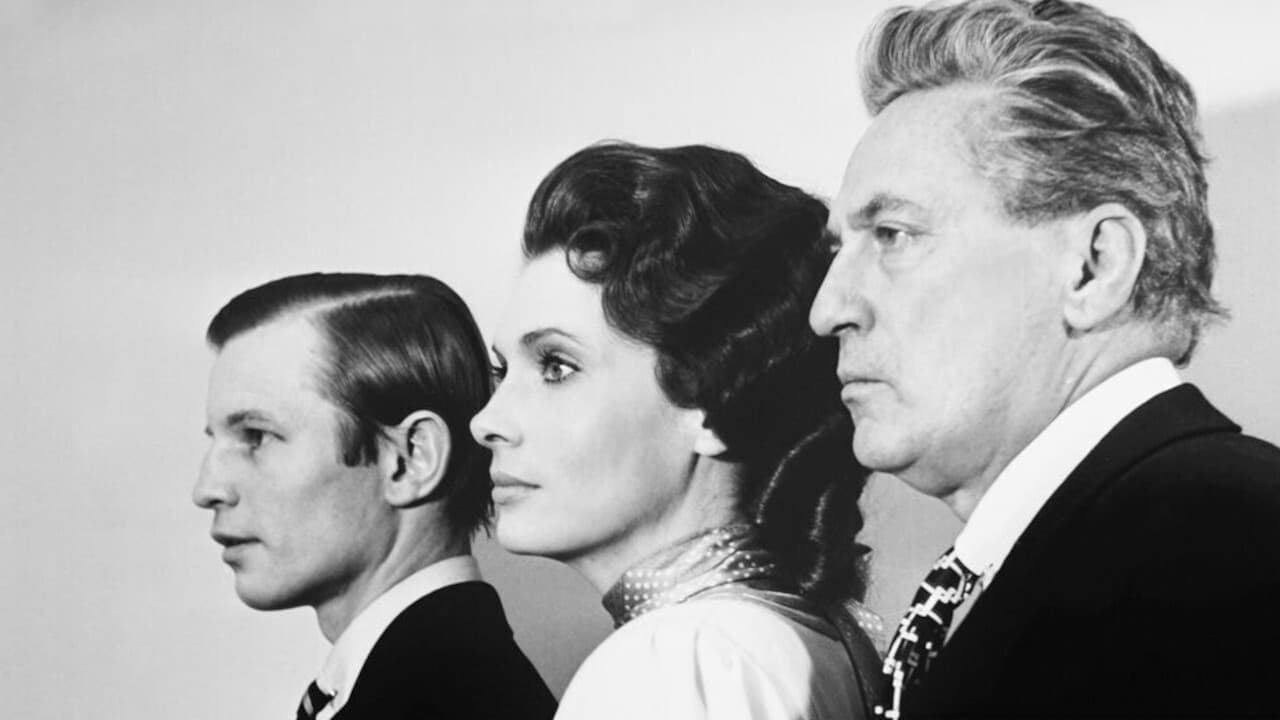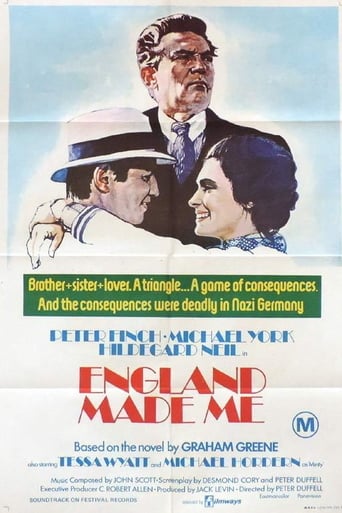

This was one of Graham Greene's early novels and certainly not his best one. It has actually the character of experimental improvisation, as if Graham Greene made an effort to write a modern novel with something like James Joyce in view. There is not much of a story, the composition of the novel being something like building up a sort of towering figure of the omnipotent business man Krogh, and the idea was actually inspired by the case of Ivar Kreuger, the Swedish multimillionaire who ended up in a suicide mystery. The whole novel takes place in Sweden.The film has reasonably enough found it necessary to make something completely different. Instead of a grey and boring diffuse Sweden we find ourselves in Nazi Germany of 1935, when Hitler was still on the rise. Poor Michael York and the beautiful Hilldegard Neil, the chief character of the film, are a brother and sister somewhat at odds with reality, especially in Germany, where Hildegard nonetheless has found a regular position as Krogh's intimate secretary. She brings her brother to Germany to help him along, where they all three (including Krogh, Peter Finch, reliable as usual,) gradually find themselves more and more alienated in the hostile and inhuman Nazi world. There are some other main figures in the plot, Michael Hordern as a typically Greeneish antihero and shabby journalist on his way down with opportunism for his only comfort, and Tessa Wyatt as Liz, a girl Michael York finds to please himself with, since he can't just stay with his sister. Then we have Joss Ackland as Haller, a kind of henchman of Krogh's to pull some strings towards the end.So much for the plot, which really isn't much of a story, not even approaching the Kreuger mystery, concentrating instead on Michael York's outsidership hopelessly prompting on honesty, but the main asset of the film is something completely different.The settings are magnificent, with exotic nightclubs, luxury palaces, enjoyable excursions and things like that, the atmosphere and set-up is genuinely good, It's a very beautiful film, but what makes this film worth while is the music by John Scott, the only thing that saves it. The actors are perfectly good but don't help the meagre story, while only the music gives it some quality of importance.
... View MoreI have seen this film a couple of times over the years and always felt there was something missing – the point of the story seems slight at best.I find the historical setting fascinating although I can't help feeling that more could have been made of it. Michael York finds himself back in Cabaret territory: pre-war Nazi Germany. He plays a young Englishman, Anthony Farrant, who visits his sister, Kate (Hildegard Neil), in Berlin and becomes involved with the corrupt business dealings of the man she hopes to marry, financier Erich Krogh played by Peter Finch. Anthony's British sense of fair play is challenged by Krogh's double dealing. Unfortunately he underestimates the danger of the situation, and the fact that just about everyone has a price. On the surface the story sounds interesting, but the way the photography and the whole thing is approached is as flat as a tack and robs the film of tension. A pity because the background of 30's Germany offers much in the way of drama – an opportunity not missed by the makers of "Cabaret" only a year before. Although "England Made Me" was shot in Europe, old Hollywood studio depictions of Germany often had more atmosphere.However, the actors make their characters convincing. Peter Finch gives Erich Krogh the gravitas he brought to his roles toward the end of his career. York is also good, basically reprising his naïve young Englishman from "Cabaret". Joss Ackland gives an edgy performance as Krogh's associate, Haller, who also acts as his minder.Definitely on the plus side, John Scott contributed a fine score that captures a sense of uncertainty and inevitability that makes up for a lot missing in other areas. Scott's music always seemed to get to the heart of the films he scored.Any film with Peter Finch is worth a look; it's just a pity the filmmakers didn't dig deeper to create the feeling that would have made the whole thing far more compelling.
... View MoreGraham Greene's novel becomes somewhat undernourished wartime melodrama, without the scope, vision or substantial budget to credibly expound on its themes. Michael York plays a young ne'er-do-well who comes to stay with his sister and her wealthy fiancé/benefactor in 1930s Germany, just before the rise of the Nazi party. An incredible period in time for storytelling, yet the human drama here fails to ignite. It's interesting but cold, without much emotion or point. Filmed in Yugoslavia (!), the movie does have a handsome look, though it surely would have benefited from a larger budget or authentic locales in order to truly capture the fervor and frenzy of Hitler-era Germany (as "Cabaret" had accomplished just one year before, curiously also starring Michael York). It's a fake, but not a bad one, a picture that does not strive (thankfully) to recreate Concentration Camp hysteria but instead provide more insight into the interpersonal complexities of this time. York is reunited with his "Lost Horizon" co-star Peter Finch, and both actors are fine if generally unmemorable. ** from ****
... View MoreThis film is usually known by the title of Graham Greene's novel on which it is based 'England Made Me'. However it also has an alternative title of 'Rape of the 3rd Reich'. And that is perhaps more indicative of what this film is about the lives of several 'ordinary' people in Germany a few years prior to WW2, being affected by the increasing power of the Nazi party all around them.The central character is Anthony Farrant played by archetypal Englishman Michael York. His sister Kate played by Hildegarde Neil, works for a rich but ruthless and cynical German industrialist Erich Krogh (Peter Finch) in Germany. Having left England for new challenges Anthony meets up with his sister (initially in France) and she then secures him a job in Krogh's company. Anthony later forms a relationship with an English woman he meets in Germany Liz Davidge played by 'English Rose' (and famously U.K D.J. Tony Blackburn's ex-wife) Tessa Wyatt. Anthony also forms a friendship with journalist 'Minty', superbly acted as a 'slob' character by Michael Hordern. Anthony sometimes tells the journo perhaps too much at a time when the Nazis were seeking control of the press and this forms the basis for the later scenarios in the movie. The final key character is Haller (Joss Ackland); he works as Krogh's right-hand man and plays a central role in scenes towards the end of the film.This is clearly a lavish production, the photography and sets are superb, and the film budget must have been extensive. The movie also contains a raft of stars. But ultimately it disappoints. The plot often moves forward too slowly (and wavers) and some of the dialogue is cliché-ridden. In my view this movie represents a wasted opportunity much more could have been made of Greene's novel than this. It's difficult to work out just why it fails to deliver I note that it was made in Belgrade in the early 70s; perhaps the regime there would not allow the production team the freedom they wanted? It's still a viewable film but don't expect the epic that the cast, budget and BAFTA-nomination might suggest.
... View More